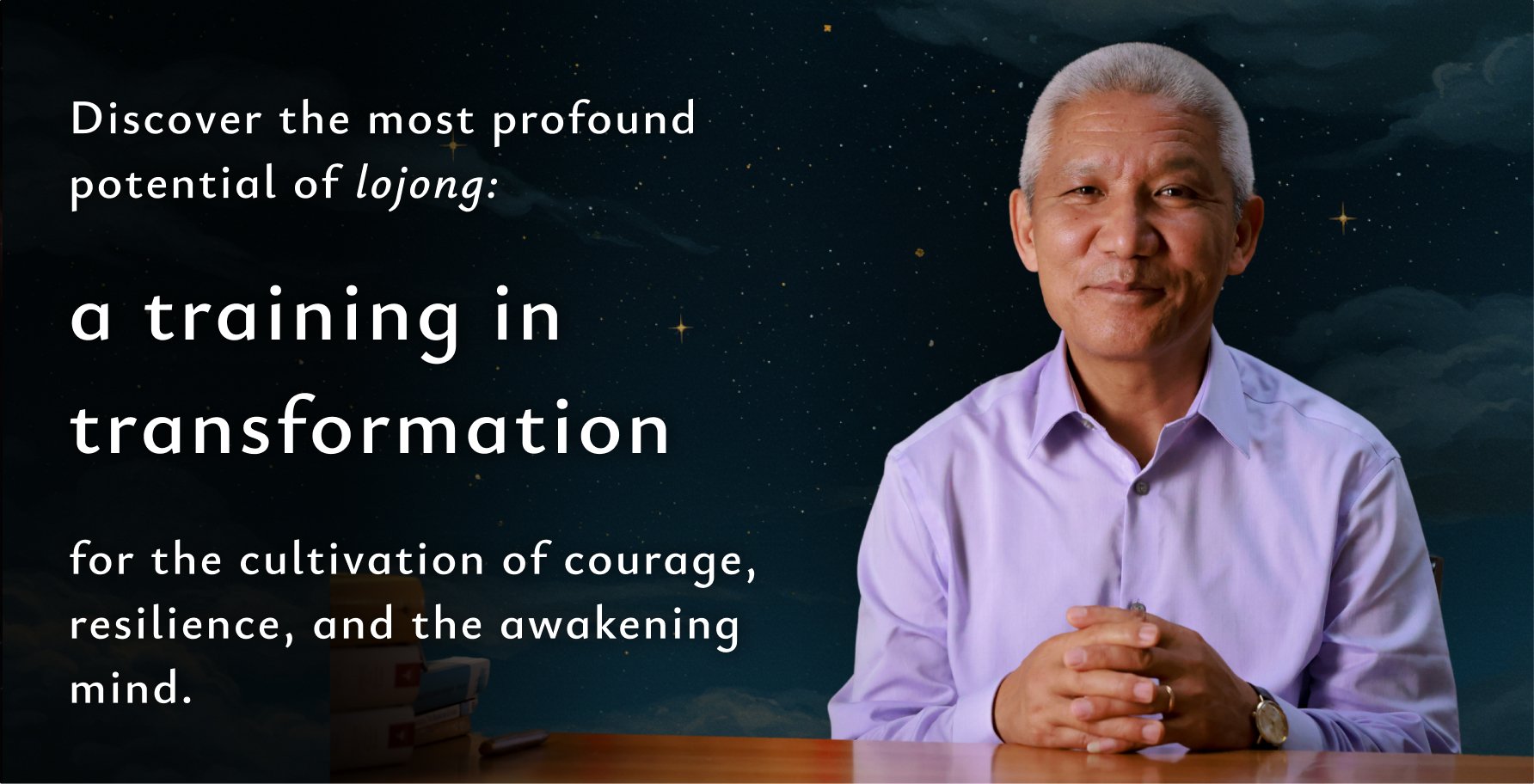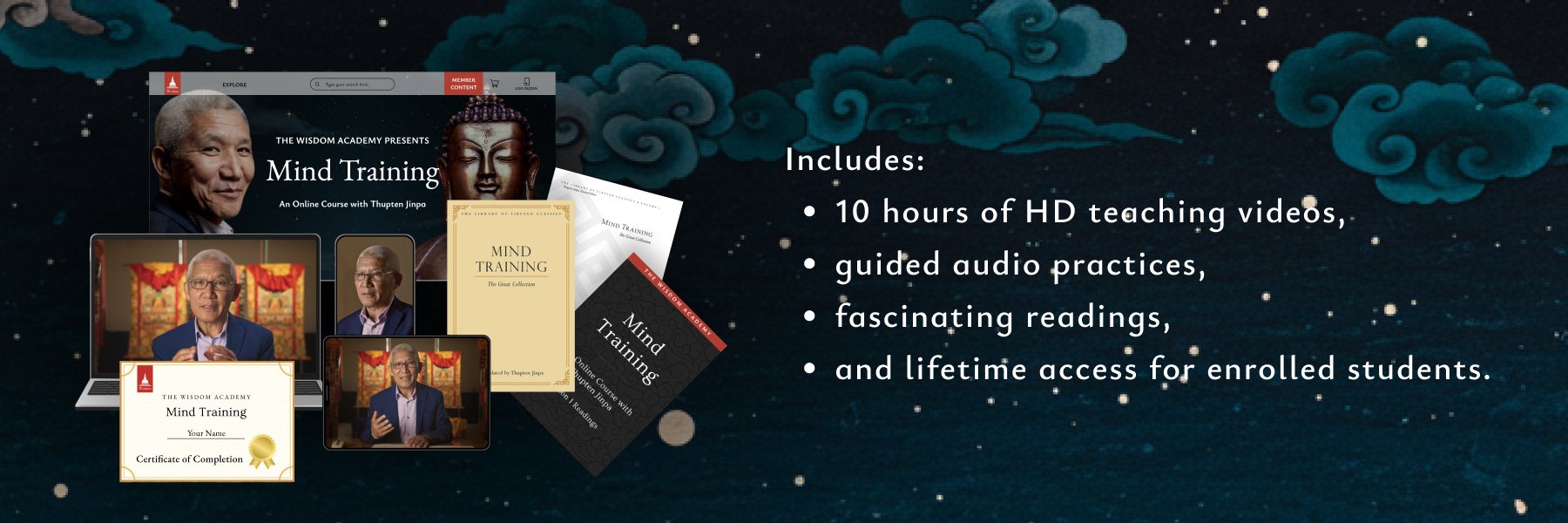
THE WISDOM ACADEMY PRESENTS
Mind Training
An Online Course with Thupten Jinpa
“Mind training” or lojong is a popular and highly effective approach for cultivating the awakening mind.
It’s a simple yet powerful method for radically transforming our minds away from self-centeredness and toward the awakened mind of other-centered altruism.
Now, you can discover this transformation for yourself in the Wisdom Academy’s new online course with Thupten Jinpa, renowned translator, scholar, author, teacher, and principal English translator for His Holiness the Dalai Lama.
In this 10-week course, you’ll journey far beyond the traditional seven-point mind training. With Jinpa as your guide, you’ll be introduced to a much broader, deeper, and more profound way of understanding and practicing lojong.
Your Tuition: $397
This course is in self-study mode, so you can take it at your own pace. After enrolling, check your email for a welcome email with instructions on how to take the course. When you enroll in any Wisdom Academy course, you agree to our terms of use. Enrolled students have lifetime access to course materials. Wisdom is a 501(c)(3) nonprofit. Your tuition supports the creation of more courses like this one. Thank you! For more about our terms, please see the Wisdom Academy FAQ.
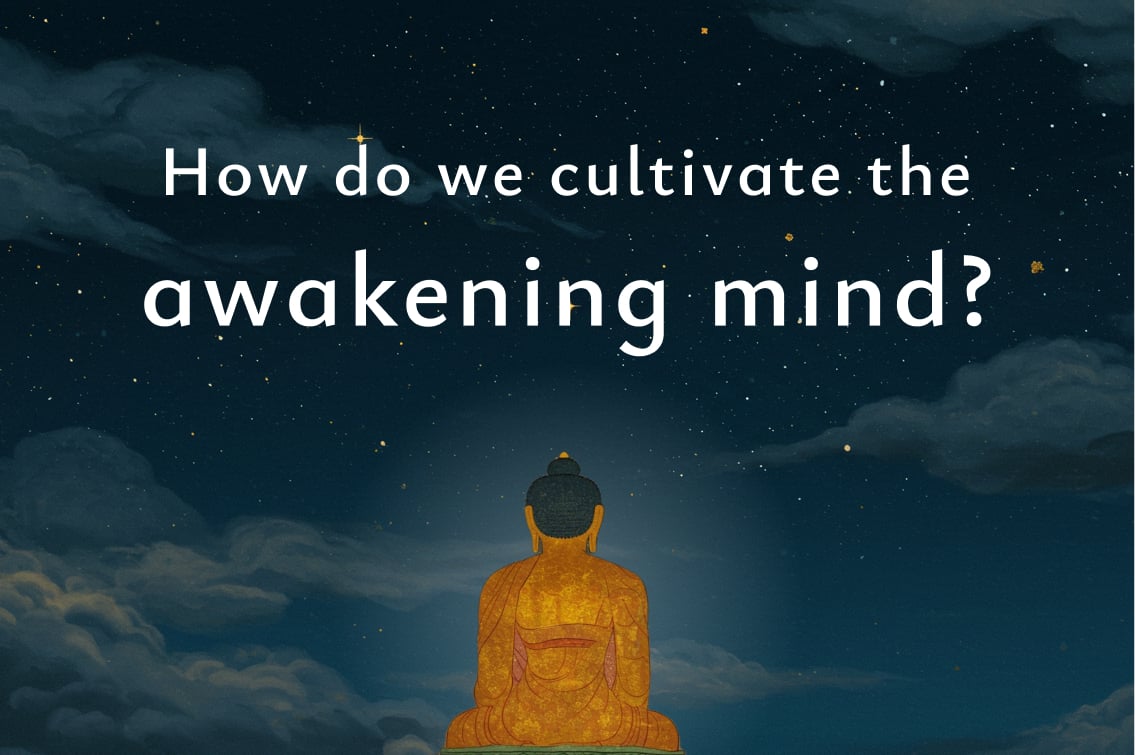
Through inspiring teaching videos, specially-curated readings (including a brand new translation from Jinpa, created for this course), guided practices, and live Q&As with Jinpa, you’ll begin to see the vast potential of mind training for your own mind and life.
Part of what lojong practice reveals to us is the unlimited power our mind has to truly uproot our self-cherishing and self-attachment, to turn suffering into resilience and strength, and to see what it would mean to live each day with an awakening mind.
Come find out for yourself. Enroll today and begin a profound journey of transformation.
This course is in self-study mode, so you can learn at your own pace. Read on for more information or click the button below to save your seat today.
Tuition: $397
This course is in self-study mode, so you can take it at your own pace. After enrolling, check your email for a welcome email with instructions on how to take the course. When you enroll in any Wisdom Academy course, you agree to our terms of use. Enrolled students have lifetime access to course materials. Wisdom is a 501(c)(3) nonprofit. Your tuition supports the creation of more courses like this one. Thank you! For more about our terms, please see the Wisdom Academy FAQ.
• Delve deeper into the Lojong teachings, and go beyond the Slogans and gain insights into the underlying psychology and theory of change.
• Learn how to radically transform you thoughts, attitudes, and habits.
• Discover a profound transformation from the ordinary deluded state, whose modus operandi is self-centeredness, to a fundamentally changed perspective of enlightened, other-centeredness.
“Within the vast expanse Tibetan Buddhist literature is a genre of writings that stands out for its inspirational power, poignant fervor, and down-to-earth practicality, all of which have made these teachings dear to the Tibetan people for generations. This is lojong, or mind training.”
—Thupten Jinpa in his preface to Mind Training: The Great Collection
Mind training, or lojong, is both a central practice in all traditions of Tibetan Buddhism and also a comprehensive genre of teachings that provide a specific approach to cultivating the awakening mind.
That approach entails a disciplined process for radically transforming our minds away from self-centeredness and toward altruism. As Jinpa writes in Mind Training: The Great Collection, “We tend not only to grasp at some kind of intrinsically real ‘self’ that constitutes our true being but also to cherish the welfare of this true ‘me’ at the expense of all others. The mind training teaching challenges us to reverse this process.”
Lojong texts include not only the famous mind training “slogans” but also deeply inspiring texts such as the root text “Seven-Point Mind Training” (Chekawa), “The Wheel of Sharp Weapons” (attributed to Dharmarakṣita), “Leveling Out All Conceptions” (Serlingpa), and “Eight Verses for Training the Mind” (Geshe Langri Thangpa).
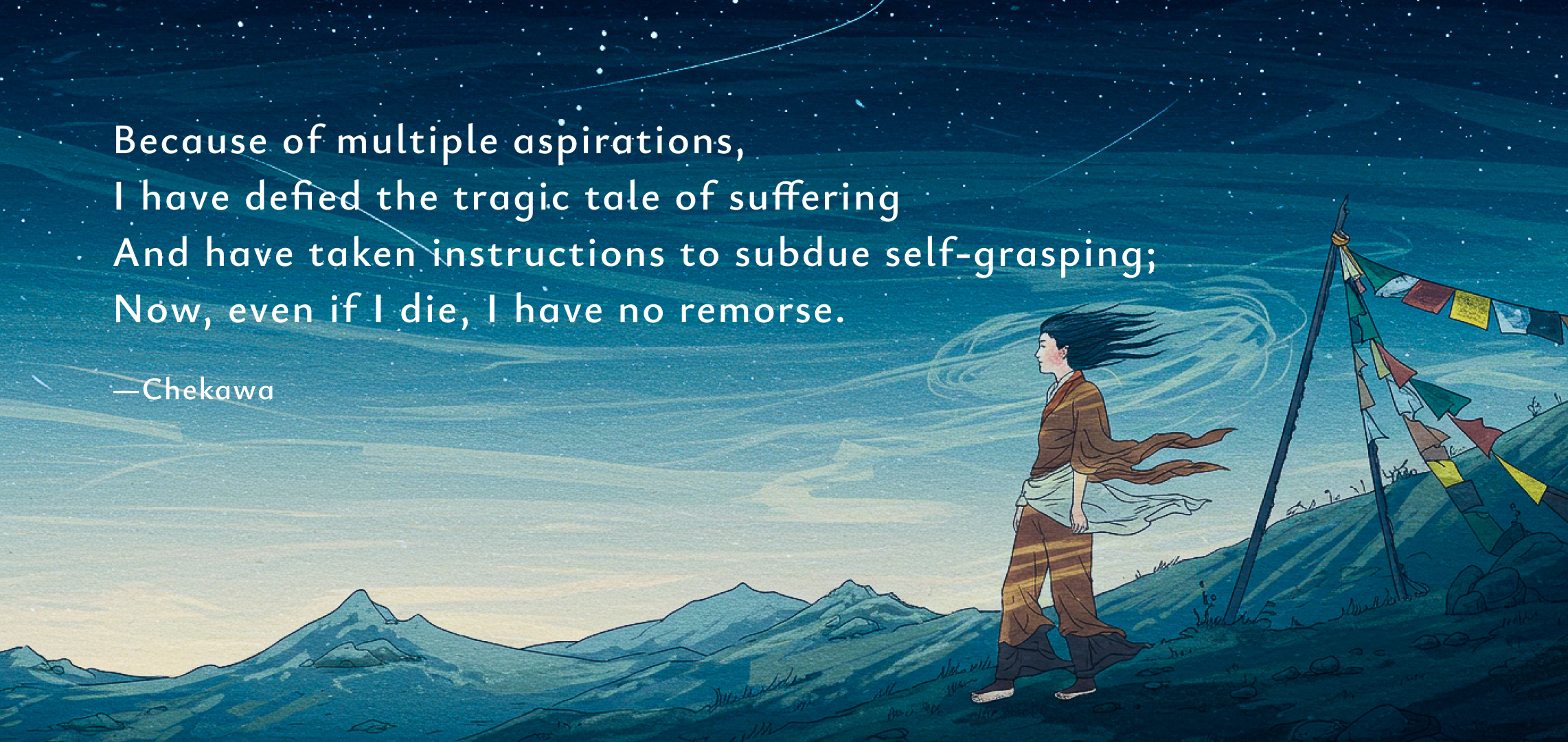
Your Tuition: $397
• How to transcend the dichotomy of hope and fear, expectation and apprehension
• How to break free from attachment to yourself
• The psychology of lojong
• How to practice mind training in everyday life
• How to transform every circumstance or event, whether positive or negative, into something that can aid you in awakening
• And much more!

I’m so grateful to be listening to Thupten Jinpa—he is a master. His clear, calm way of teaching us about strength and resilience is a jewel of humanity.
Manuel Cohen Valerio, student in Mind Training“Even a single line [of lojong] can be seen as encapsulating the entire teaching of the Buddha, for even a single statement of mind training has the power to subdue self-cherishing and the mental afflictions.”
—Thupten Jinpa in the preface to Mind Training: The Great Collection

Lesson 1: Key Teachings of Lojong and Their Sources
Thupten Jinpa fleshes out the concept of mind training and its significance within the broader Buddhist tradition. He explains how these essential practices and mental antidotes are encapsulated by seven key points of mind training. You’ll gain essential background on the lojong tradition and a roadmap for how to train the mind in this context.

Lesson 2: The Wheel of Sharp Weapons
Jinpa details the lojong teachings’ extraordinary origin story by recounting Lama Atisha’s encounters with masters Serlingpa, Dharmarakṣita, and Maitrīyogi. Jinpa provides reflections on Dharmarakṣita’s Wheel of Sharp Weapons, a powerful self-exhortation centered around transmuting afflictions, accepting “karmic justice,” and destroying self-grasping and self-cherishing through a unique invocation of the deity Yamāntaka. You’ll join Jinpa as he reviews highlights from a cherished text containing all three key themes of mind training.

Lesson 3: Atisha’s Mind Training in Seven Points
Jinpa discusses in depth the seven key points of mind training as enumerated by Atisha and later popularized by Geshe Chekawa and others. Through the lens of Atisha’s Root Lines on Mind Training, Jinpa emphasizes the importance of these seven points as a summary of which practices to apply in given situations. You’ll learn about how the 16 commitments and 22 precepts of mind training constitute crucial ingredients for a life committed to cultivating the two awakening minds.

Lesson 4: Training in Ultimate Awakening Mind
Jinpa touches on the importance of the language of “the two awakening minds” in the lojong teaching and its relation to the general Mahayana framework of wisdom and method. Describing the process of cultivating the ultimate awakening mind, he introduces the five analogies of a dream, a magical illusion, clouds, water bubbles, and space. You’ll discover the important distinction between the space-like perception of the sitting period and the illusion-like perception of the post-sitting period.

Lesson 5: Training in Conventional Awakening Mind
Jinpa provides a heartfelt summary of the methods for cultivating the conventional awakening mind according to the great Indian masters and the mind training tradition. You’ll be inspired by a deeper understanding of how the shoot of bodhicitta arises from the seed of compassion, planted in the even soil of equanimity moistened by loving-kindness.

Lesson 6: Transforming Adversities into the Path of Enlightenment
Jinpa introduces the unique mind training instructions on transforming life’s challenges, including sickness and misfortune, into conducive conditions for spiritual advancement. He explains the deeper meaning of powerful one-liners such as “banish all blames to a single source.” You’ll learn how to reconceptualize personal obstacles and develop powerful antidotes to the afflictions that accompany them by relying on the fourfold practice and the five ways of taking into the path.

Lesson 7: “Leveling Out All Conceptions” and Other Instructions
Jinpa probes deeper into the crux of the instructions on transforming adversities into the path by reading several key passages from texts attributed to masters Serlingpa, Chengapa, Thokme Sangpo, and others. You’ll enhance your appreciation of important lojong concepts such as cognitively reframing difficulties, contemplating “stoic-like” aphorisms, viewing sufferings as displays of ultimate reality’s expanse, and maintaining a joyful, resilient, and decisive mind.

Lesson 8: A Lifetime’s Practice in Summary and Measures of Progress
In accordance with the mind training tradition, Jinpa lays out a groundwork for how to train in lojong for each day of the rest of your life. He also touches on how to evaluate the level to which your practice has progressed. You’ll discover how to apply the five powers and rely on the “witness” of self-awareness in everyday life to achieve tremendous progress on your lojong journey.

Lesson 9: Psychology and Theory of Transformation Behind Mind Training
Jinpa delves into the psychological underpinnings of the mind training methodology, identifying an iterative process where perception drives interpretation and then emotion, behavior, and finally habit formation. You’ll learn about the mechanics involved with the lojong theory of motivation, the use of reinforcing “slogans,” the psychology of joy, and the application of imagination and intention.

Lesson 10: Daily Practice and Applying Mind Training in Everyday Life
Jinpa summarizes the entire mind training journey of the previous nine lessons, drawing thoughtful conclusions about the attendant attitudes, prescribed affect, emotional regulation, adversity response, and maintenance of serenity involved with fully qualified lojong practice. You’ll obtain a holistic understanding of the mind training tradition and easy-to-understand instructions on how to integrate learnings from the course into your everyday practice.

Your Course Includes
10 teaching videos from Jinpa, each 45+ minutes
Guided audio practices from Jinpa
Specially-curated readings, including a brand-new translation made for this course
A forum to discuss with fellow students
Lifetime access to course materials
1) If you want to develop a much more profound and comprehensive understanding of mind training with Thupten Jinpa, translator for His Holiness the Dalai Lama and one of the world’s leading experts on Buddhism.
2) If you want a clear, practical method for dispelling self-cherishing and self-attachment.
3) If you want to learn how to truly cultivate the awakening mind in everyday life.
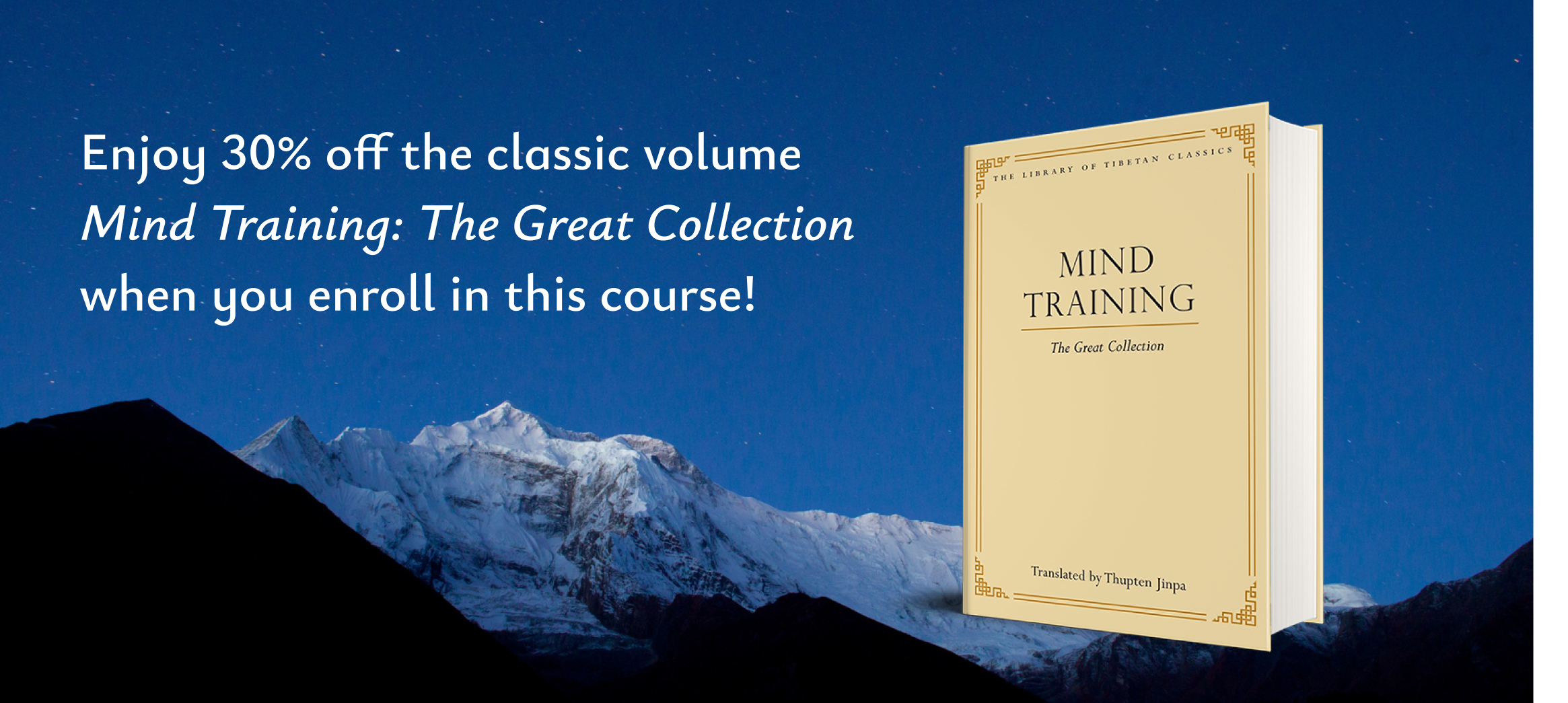

Thupten Jinpa Langri was educated in the classical Tibetan monastic academia and received the highest academic degree of Geshe Lharam (equivalent to a doctorate in divinity). Jinpa also holds a BA in philosophy and a PhD in religious studies, both from the University of Cambridge, England. Since 1985, he has been the principal translator for the Dalai Lama, accompanying him to the United States, Canada, and Europe. He has translated and edited many books by the Dalai Lama, including The World of Tibetan Buddhism, Essence of the Heart Sutra, and the New York Times bestseller Ethics for the New Millennium.
Jinpa has published scholarly articles on various aspects of Tibetan culture, Buddhism, and philosophy, and books such as Songs of Spiritual Experience: Tibetan Poems of Awakening and Insight (coauthored) and Self, Reality and Reason in Tibetan Thought. He is the editor of the Library of Tibetan Classics. He serves on the advisory board of numerous educational and cultural organizations in North America, Europe, and India. He is currently the president and the editor-in-chief of the Institute of Tibetan Classics, a nonprofit educational organization dedicated to translating key Tibetan classics into contemporary languages. He also currently chairs the Mind & Life Institute and the Compassion Institute.
The Wisdom Academy is the leading provider of high-quality online courses about Buddhism and meditation.
The Wisdom Academy was founded in 2016. Since then, we’ve grown to be the leader in online Buddhist learning, with over 50 courses and thousands of students enrolled.
In the Academy, dedicated students come together with beloved teachers to learn authentic philosophy and practices for awakening.
Our courses offer teachings on Dzogchen, shamatha, mahamudra, vipassana, mindfulness, jhana, and much more. The clear, progressive structure of the courses will support you in learning about the profound philosophy and practices of the Dharma. You’ll discover the vivid and immediate ways that the teachings can create more ease, joy, and freedom in your daily life. Click here to learn more and explore our course catalog.
![]()


